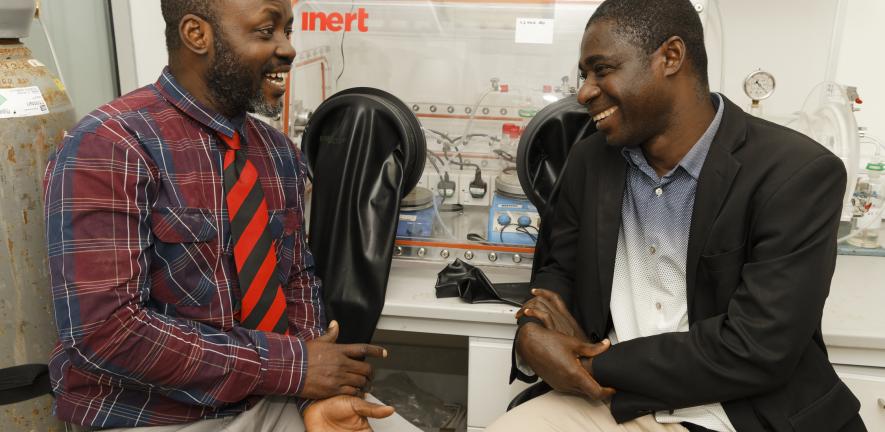
Hazardous levels of arsenic in drinking water sources in Nigeria and Ghana are of great public health and environmental concern. Access to the laboratories and expertise of Cambridge researchers is an essential way to accelerate research into cheap and accessible solutions to heavy metal water pollution.
Dr Owolabi Bankole, from Adekunle Ajasin University, Nigeria, and Dr Ismaila Emahi, from the University of Energy and Natural Resources, Ghana, each focus on different aspects of this problem.
Detecting heavy metals with DNA
Ismaila’s research explores flexible single strands of DNA called aptamers. DNA classically is structured as a double helix which is a rigid structure, but using a single strand has more versatility in research since it is more flexible. Ismaila is characterising aptamers in order to detect heavy metal pollution in water.
“My ultimate research goal is to develop artificial tongues,” comments Ismaila. “Let me explain: my aim is to use aptamers as a tongue to sense heavy metals in water and then also remove them. Sensing is the first step, but I want to go beyond just sensing to removal.”
Ismaila colloquially refers to his aptamer device as a tongue since it can detect the heavy metals in water (i.e. taste) but also remove them (i.e. eat).
Dr Jenny Zhang, who runs a bioelectrochemistry group, has the electrochemical expertise to help Ismaila characterise how DNA aptamers behave in the presence and absence of heavy metals. Ismaila visited the department for seven weeks this summer to conduct this preliminary work, ultimately to return to Ghana for the next stages of research.
She comments: “Poor water quality is a huge problem all over the world – even for the UK. By collaborating with passionate scientists like Ismaila around the world, we hope to find more impactful solutions quicker together”
Ismaila completed his PhD at St Louis University, Missouri, where he used aptamers to identify different catalysts used in biofuel cells. Upon returning to Ghana, Ismaila revised his research to an approach that was more relevant to solving local problems like water pollution. He notes that a lot of techniques exist for heavy metal detection, but using aptamers would be an accessible and cheap way to test water.
Ismaila is also an Iso Lomso fellow of Stellenbosch Institute for Advance Study.
Decontaminating arsenic in water with low cost filters
Arsenic takes two main forms in water and Owolabi is developing a filter to adsorb its different forms. Arsenates are charged and can be effectively removed, but arsenites are highly soluble and mobile in water which makes them difficult to catch. Therefore, the filter needs to change the arsenites into a form that is easier to catch along with removing all the other types of arsenic . His research addresses this issue by exploring different porous materials that he has developed in Nigeria.
Owolabi comments: “Our primary objective is to address the issue of wastewater contamination caused by carcinogenic organic and inorganic pollutants originating from industries such as textiles, dyes, and related sectors.
“Additionally, we strive to enable the pre-treatment of water contaminated with organic and inorganic pollutants in Nigeria, where water treatment technologies are not given high priority.”
Owolabi’s work involves combining polymers and metal oxide nanoparticles to test which combinations have the best properties for absorbing arsenic. He visited Professor Stuart Clarke’s laboratory earlier this summer, which has the specialist equipment and knowledge he needed to accelerate this process. Owolabi has now taken his findings back to Nigeria for the next stages of research.
Owolabi completed his PhD at Rhodes University, South Africa, where he specialised in synthesis, before moving to the Adekunle Ajasin University in Nigeria. His research explores nanostructures that help degrade pollutants for environmental remediation.
These amazing collaborations were made possible thanks to the support of the Cambridge-Africa ALBORADA Research Fund, which provides funding for collaborations between researchers in Africa and Cambridge.
Owolabi’s work on water treatment is also sponsored by the International Foundation for Science and the Tertiary Education Trust Fund.

